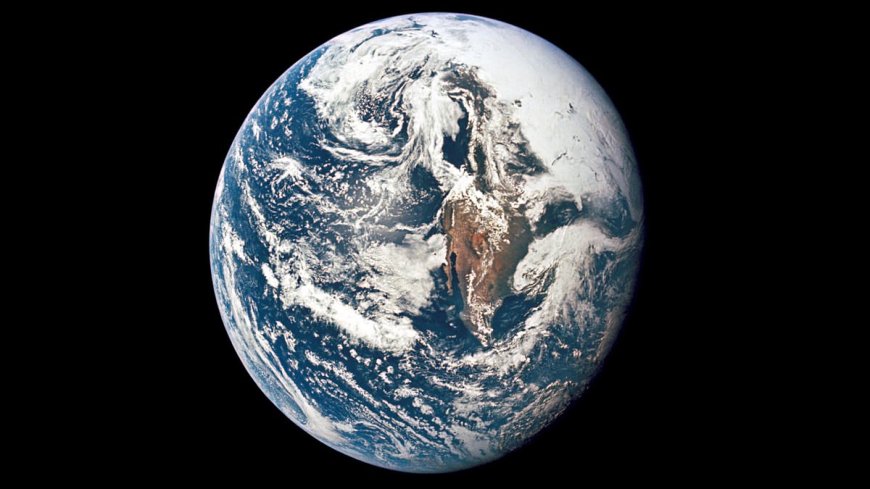Earth's Rotation Speeds Up, Shortest Day Expected Tomorrow
Scientists predict that tomorrow could be the shortest day ever due to Earth's accelerating rotation. Recent observations show Earth spinning faster, with days in summer expected to be 1.3-1.51 milliseconds shorter. Various factors like changes in the atmosphere and core motion may be contributing to this phenomenon.

Scientists have warned that Wednesday could be the shortest day of your life as Earth's accelerating rotation is expected to move quicker than ever before. They found that three days this summer, July 9, July 22, and August 5, are expected to be between 1.3 and 1.51 milliseconds shorter than the standard day. This is because Earth's rotation has sped up in recent years, with scientists observing the phenomenon on atomic clocks in 2020 and 2022.
These clocks are incredibly accurate machines that keep time by measuring the vibrations of atoms. Although the exact reason is still a mystery, scientists believe there could be several factors that are making Earth spin faster, including changes in the atmosphere, the melting of glaciers, motion in the Earth's core, and a weakening magnetic field.
Earth normally takes 24 hours, or exactly 86,400 seconds, to complete one full rotation, which is called a solar day. The fastest day recorded so far was one year ago on July 5, 2024, when Earth spun 1.66 milliseconds faster than the standard 24 hours.
While tomorrow's shortened day may seem insignificant, researchers have found that the time change can affect everything from satellite systems and GPS accuracy to how we measure time itself. Earth's rotation has never been perfect, as it shifts by tiny amounts throughout time, getting a few milliseconds faster or slower.
However, scientists didn't start keeping exact records of these changes until the 1970s. For the latest estimates of Earth' spin, Graham Jones, an astrophysicist at the University of London, used information from the US Naval Observatory and international Earth rotation services. Atomic clocks tracked the numbers, measuring what's called 'Length of Day,' or LOD. That's the time it takes Earth to rotate once, down to the millisecond.
Even tiny changes in day length matter. GPS, phone networks, and financial systems rely on split-second accuracy. A shift of just a few milliseconds can cause technical glitches. Before this recent acceleration in Earth's spin, the planet was actually slowing down, due to the moon's gravitational pull, which has been stretching our days into the 24-hour cycle we now live by in modern times.
Geoscientist Stephen Meyers, a professor at the University of Wisconsin-Madison, found that as the moon moves further away, its changing gravitational impact on Earth would slowing make days incrementally longer. Meyers predicted that days on our planet could eventually become 25 hours long, but noted that it would take about 200 million years.
As for why Earth has sped up since 2020, natural forces like climate change may be playing a role in the planet's spin. Weather patterns like El Niño and the accelerated melting of glaciers in summer may literally be throwing the planet out of balance by a tiny degree. Richard Holme, a geophysicist at the University of Liverpool, added: 'There is more land in the northern hemisphere than the south.' 'In northern summer, the trees get leaves, this means that mass is moved from the ground to above the ground — further away from the Earth's spin axis,' he told Live Science.
Basically, the rate of rotation of any moving body like Earth depends on its distribution of mass. It's similar to how a figure skater spins faster by pulling in their arms. Another reason for this sudden change could be shifting molten layers in the core. Earth is not solid all the way through. Its core is made of hot, swirling liquid metal.
As that molten metal moves, it can change the planet's shape and balance. Scientists are looking at all these pieces together, the moon's orbit, core activity, ocean flow, and wind patterns, to figure out what's going on. Starting in 2020, Earth began breaking its records for the shortest day.
That year, July 19 came in 1.47 milliseconds short. On July 9, 2021, there was a 1.47 millisecond drop. In 2022, Earth recorded its shortest day on June 30, shaving off 1.59 milliseconds from the usual 24 hours. In 2023, the rotation slowed slightly, and no new records were set. In 2024, however, the speed picked up again. Several days broke the previous records, making it the year with the most consistently shorter days on record.
These estimates are based on past observations and computer models, and include systematic corrections and smoothing to account for natural fluctuations. Right now, the world keeps time using Coordinated Universal Time, or UTC. Sometimes we add a leap second to stay in sync with Earth's slow shifts. If the Earth keeps rotating faster, experts may have to remove a second, called a negative leap second. It's never happened before.
What's Your Reaction?
 Like
0
Like
0
 Dislike
0
Dislike
0
 Love
0
Love
0
 Funny
0
Funny
0
 Angry
0
Angry
0
 Sad
0
Sad
0
 Wow
0
Wow
0











































































































































































